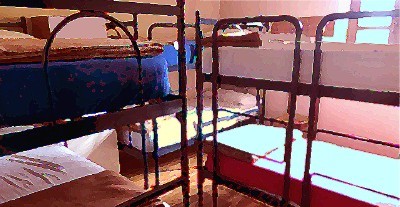
| Should Senior Travelers Try Hostels? |
 |
 Guest Senior Contributor JKT, Milwaukee WI: When a friend first suggested this long-retired traveler try a hostel, I sneered. Did I want to spend nights in a crowded, sweaty dorm with a bunch of pot-smoking, rock music crazed, unwashed and unemployed juvenile delinquents? He insisted that the impression was wrong, and told me about hostel rates compared to hotels and other advantages. That got my attention. Costs: Hotel rates have risen every year for at least the past decade, and show no signs of falling. It’s not unusual today to pay $300 a night at a small, very basic hotel room in New York, London or Tokyo. Hostel rates in the same cities may range from $25 a night in a bunk room with shared bath, to a private room and bath for $40. My hostel experiences: I took my friend’s advice this year on a trip to London, England. The hostel was in a former private home in one of the city’s picturesque 19th Century townhouse areas. The third-floor walk-up room was so small, I had to crawl across the bed to look out the window, which had a beautiful view of Hyde Park. I paid about $30 a night. Nearby hotel rooms cost at least $150. More recently I did it in a popular American vacation town, where some hostel price lists were like a discount store. The lowest was advertised at $13.39 for a bunk in an eight-person dorm, and highest priced was $26.79 for a private room with bath. There was an added bonus of all the free breakfast pancakes and coffee you could make yourself. Disadvantages: If you’re accustomed to the human services and glitz of hotels, a hostel may be a cultural shock. No bellboys, maids nor elevators. Linens, pillows, soap and towels are provided for you to do your own housekeeping. If you book the cheapest hostel accommodations, you could be in a dorm of two-tier bunks with seven or more roommates and shared bathrooms. Some European and Far East hostel rooms are co-ed. One big hostel problem can be for seniors who want a quiet night’s sleep. When the place is full of young guests, there’s not much constraint on talk, rock music and other youthful activities. In the more hip ones, smoking of all kinds of products may be allowed. Additionally, hostels attract backpackers who may arrive in your dorm after several days and nights on the road. Your nose will sense their dire need for showers and clean laundry. Advantages: Of course, the overwhelming plus is that hostels typically charge half or less than hotels, often with free buffet breakfasts. Also, the informality makes the atmosphere friendlier and more convenient for coming and going. As in any journey, you usually spend only eight of the day’s 24 hours sleeping, and the rest out enjoying your visit. So, why pay $25 or more for each hour you’re asleep. Another plus factor is that in the informal environment of a hostel, you get to know other guests, rarely experienced in big, impersonal hotels. You can talk comfortably with interesting people, both young and mature, and share your stories. Of course, if you’d rather just sleep, be sure to have an eye mask and noise-cancelling earphones Do thorough research: Hostels may not be inspected regularly for cleanliness and safety. Further, you must accept that many hostel buildings are old, with all the usual problems with safety, infestation and cleanliness. Utilizing the internet, thoroughly check out all possible hostels at your travel destination before you leave home. Many have their own websites, complete with photos of the facilities. Consider all necessary information, including references from recent guests. Another factor is that the hostel should be near transportation, shopping, entertainment, restaurants, parks and receation. |